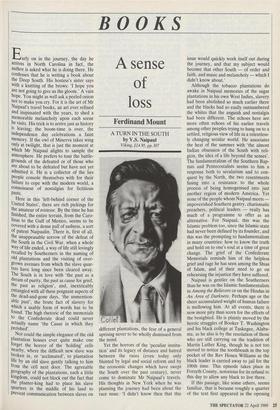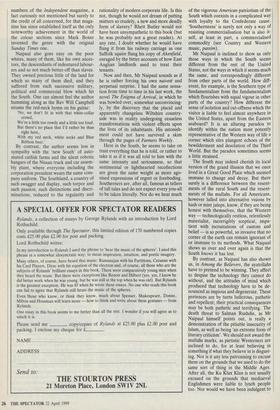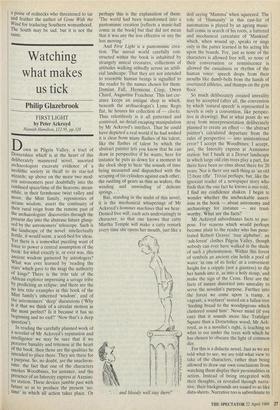BOOKS
A sense of loss
Ferdinand Mount
A TURN IN THE SOUTH by V.S. Naipaul Viking, £14.95, pp.307 Early on in the journey, the day he arrives in North Carolina in fact, the author is asked what he is doing there. He confesses that he is writing a book about the Deep South. His hostess's sister says With a knitting of the brows: 'I hope you are not going to give us the gloom.' A vain hope. You might as well ask a peeled onion not to make you cry. For it is the art of Mr Naipaul's travel books, an art ever refined and inspissated with the years, to shed a memorable melancholy upon each scene he visits. His trick is to arrive just as history is leaving; the boom-time is over, the independence day celebrations a faint memory. If the owl of Minerva takes wing Only at twilight, that is just the moment at Which Mr Naipaul alights to sample the atmosphere. He prefers to tour the battle- grounds of the defeated or of those who are about to be defeated but have not yet admitted it. He is a collector of the lies People console themselves with for their failure to cope with the modern world, a connoisseur of nostalgias for fictitious pasts.
Here in this `left-behind corner of the United States', there are rich pickings for the amateur of tristesse. By the time he has finished, the entire terrain, from the Caro- linas to the Gulf of Mexico, seems to be covered with a dense pall of sadness, a sort of patent Naipaulin. There is, first of all, the unappeasable sorrow of the defeat of the South in the Civil War, when a whole way of life ended, a way of life still lovingly recalled by Southerners in the naming of old plantations and the visiting of over- grown avenues from which the slave quar- ters have long since been cleared away. The South is in love with 'the past as a dream of purity, the past as cause for grief, the past as religion', and, inextricably entangled with all these poignant aspects of the dead-and-gone days, 'the unmention- able past', the brute fact of slavery for Which a usable form of words has to be found. The high rhetoric of the memorials to the Confederate dead could never actually name 'the Cause in which they perished'.
Nor could the simple elegance of the old plantation houses ever quite make one forget the horror of the 'holding' cells nearby, where the difficult new slave was broken in, or 'acclimated', to plantation life by an old slave gently talking to him from the cell next door. The agreeable geography of the plantations, each a little kingdom, could not block out the fact that the planter-king had to place his slave quarters in the middle of his land to prevent communication between slaves on different plantations, the fear of a general uprising never to be wholly dismissed from the mind.
Yet the horrors of the 'peculiar institu- ticn' and its legacy of distance and hatred between the races (even today only blunted by legal and social reform and by the economic changes which have swept the South over the past century), never come to dominate Mr Naipaul's travels. His thoughts in New York when he was planning the journey had been about the race issue. 'I didn't know then that this issue would quickly work itself out during the journey, and that my subject would become that other South — of order and faith, and music and melancholy — which I didn't know about.'
Although the tobacco plantations do awake in Naipaul memories of the sugar plantations in his own West Indies, slavery had been abolished so much earlier there and the blacks had so easily outnumbered the whites that the anguish and nostalgia had been different. The echoes here are more often echoes of his earlier travels among other peoples trying to hang on to a settled, religious view of life in a relentless- ly changing secular world. He associates the heat of the summer with 'the almost Indian obsession of the South with reli- gion, the idea of a life beyond the senses'. The fundamentalism of the Southern Bap- tists and Pentecostalists seems to him a response both to secularism and to con- quest by the North, the two resentments fusing into a resistance to the whole process of being homogenised into just another region of modern America. Yet none of the people whom Naipaul meets — impoverished Southern gentry, charismatic preachers, political leaders — really has much of a programme to offer as an alternative. For Naipaul, this was the Islamic problem too, since the Islamic state had never been defined by its founder, and this was the prompting to fundamentalism in many countries: how to know the truth and hold on to one's soul at a time of great change. The grief of the Confederate Memorials reminds him of the helpless grief and rage he has seen among the Shias of Islam, and of their need to go on rehearsing the injustice they have suffered.
Naipaul is gentler on the Southerners than he was on the Islamic fundamentalists in Among the Believers or on the Hindus in An Area of Darkness. Perhaps age or the sheer accumulated weight of human failure is mellowing him. At all events, there is now more pity than scorn for the efforts of the benighted. He is plainly moved by the heroic struggles of Booker T. Washington and his black college at Tuskegee, Alaba- ma, as he also is by the resolution of those who are still carrying on the tradition of Martin Luther King, though he is not too moved to notice the toothbrush in the top pocket of the Rev Hosea Williams as the black leader is carried away to jail for the 106th time. This episode takes place in Forsyth County, notorious for its refusal to this day to allow any black to live there.
If this passage, like some others, seems familiar, that is because roughly a quarter of the text first appeared in the opening numbers of the Independent magazine, a fact curiously not mentioned but surely to the credit of all concerned, for that maga- zine has since established itself as the only noteworthy achievement in the world of the colour sections since Mark Boxer invented the genre with the original Sunday Times one.
Naipaul also goes easy on the poor whites, many of them, like his own ances- tors, the descendants of indentured labour- ers and so not much better. off than slaves. They owned precious little of the land for which so many of them died, and they suffered from each successive military, political and commercial blow which hit the South. One can almost feel the author humming along as the Rev Will Campbell strums the red-neck hymn on his guitar: 'No, we don't fit in with that white-collar crowd,
We're a little too rowdy and a little too loud. But there's no place that I'd rather be than right here, With my red neck, white socks and Blue Ribbon beer.'
By contrast, the author seems less in sympathy with the 'new South' of auto- mated catfish farms and the silent robotic hangars of the Nissan truck and car assem- bly plant, where everyone including the corporation president wears the same com- pany uniform. The Southland, a country of such swagger and display, such torpor and such passion, such distinctions and discri- minations, reduced to the regularity and
rationality of modern corporate life. Is this not, though he would not dream of putting matters so crudely, a new and more deadly form of slavery? Rhett Butler would not have been unsympathetic to this book (but he was probably not a great reader). At any rate, I doubt whether he would have flung it from his railway carriage as one Suffolk squire flung his copy of Akenfield, enraged by the bitter accounts of how East Anglian landlords used to treat their tenants.
Now and then, Mr Naipaul sounds as if he is rather forcing his own naivete and perpetual surprise. I had the same sensa- tion from time to time in his last work, the novel The Enigma of Arrival, in which he was bowled over, somewhat unconvincing- ly, by the discovery that the placid and apparently changeless Wiltshire country- side was in reality undergoing ceaseless transformations with violent effects upon the lives of its inhabitants. His astonish- ment could not have survived a skim through the pages of Farmers Weekly.
Here in the South, he seems to take on trust everything that he is told, or rather to take it as if it was all told to him with the same intensity and seriousness, so that sentimental or lighthearted recollections are given the same weight as more ago- nised expressions of regret or foreboding. Southerners are, after all, famous as tellers of tall tales and do not expect every you-all to be taken literally. Nor do we hear much
of the vigorous American patriotism of the South which coexists in a complicated way with loyalty to the Confederate cause. `Southernness' is surely not only a way of resisting commercialisation but is also it- self, at least in part, a commercialised commodity (see Country and Western music, passim).
Mr Naipaul is inclined to show us only those ways in which the South seems different from the rest of the United States, not the ways in which it seems much the same, and correspondingly different from other parts of the world. How diff- erent, for example, is the Southern type of fundamentalism from the fundamentalism which flourishes with equal vigour in other parts of the country? How different the sense of isolation and cut-offness which the visitor is liable to feel almost anywhere in the United States, apart from the Eastern seaboard? It is an alluring paradox to identify within the nation most potently representative of the Western way of life a corner which stirs plangent echoes of the bewilderment and desolation of the Third World. But the paradox sometimes seems a little strained.
The South may indeed cherish its local version of the grand illusion that we once lived in a Great Good Place which seemed immune to change and decay. But there surely is a difference between the resent- ments of the rural South and the resent- ments of the mullahs. For all Americans, however lulled into alternative visions by hash or mint juleps, know, if they are being honest with themselves, that the Western way — technologically restless, relentlessly materialist, incorrigibly sceptical, impa- tient with incrustations of custom and belief— is so powerful, so invasive that no corner of the earth can remain ignorant of or immune to its methods. What Naipaul shows us over and over again is that the South knows it has lost.
By contrast, as Naipaul has also shown us, in Among the Believers, the ayatollahs have to pretend to be winning. They affect to despise the technology they cannot do without, and the attitudes of mind which produced that technology have to be de- nounced as impious and degenerate. These pretences are by turns ludicrous, pathetic and repellent; their practical consequences may be both pathetic and terrifying. The death threat to Salman Rushdie, as Mr Naipaul himself points out, is really a demonstration of the pitiable insecurity of Islam, as well as being 'an extreme form of literary criticism'. We should not award the mullahs marks, as pietistic Westerners are inclined to do, for at least believing in something if what they believe in is disgust- ing. Nor is it any less patronising to excuse them on the grounds that we used to do the same sort of thing in the Middle Ages. After all, the Ku Klux Klan is not usually excused on the grounds that mediaeval Englishmen were liable to lynch people too. Nor would we have been indulgent to a posse of rednecks who threatened to tar and feather the author of Gone With the Wind for traducing Southern womanhood. The South may be sad, but it is not the same.




































































 Previous page
Previous page